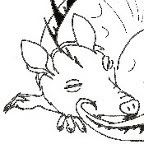
The Secret Hour
Touching Darkness
Blue Noon
by Scott Westerfeld
Because I recently read a book by him, and they reminded me how much I liked him, I re-read this series again. I LOVE this series.
Like all Westerfeld books I've read so far, they have great tension, are fast-paced, and highly original. They are also peppered with random interesting factoids (he researches his stuff very well, and I love random factoids). I guess the best way to describe his books is with the word "cool." What other word fits them so well?
Like a lot of his other stuff, this one is YA (the main characters are all teenagers). One of the reasons I love this series especially is because it's all about things that go bump in the night. Quite literally. Great spooky read! (Three of the teenagers in the book are...um...goth-y outcasts, if that means anything to anyone. And there are all sorts of monsters in it.)
The characterization in this series is wonderful, as well. The characters are well-developed and constantly evolving...but I don't want to say anything about any of them—I don't want to spoil the twists of the plot—but...well, it's just cool. Wow, that was vague. Here's one specific: I don't particularly care for math. It was never my best subject, and I always found it a bit boring. Somehow Westerfeld takes math and makes it, not only interesting, but basically into a superpower, and I loved every minute of it. That takes talent.
One more thing I have to say about this series and Westerfeld's ability to create tension: at the close of the first book, I was left believing the second book would HAVE to be a letdown. After all, where could he go from the tension of the first? How could he create something more exciting and interesting than The Secret Hour? And then I read the second, and was amazed. And then picked up the third book thinking, there's no way he could do that again. No way this one has as much suspense as the last...yet, the third was just as good as the others, if not better.
I hope he does another book for this series sometime. I really want to know what happens next...






